Watchmen: Adapting the Book to Film
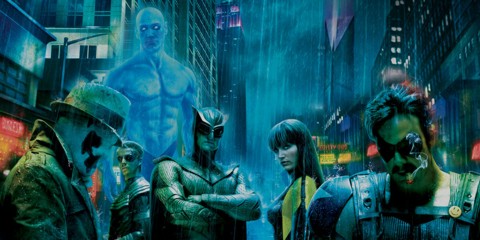
In 1985, the comic book genre was forever changed when writer Alan Moore and artist Dave Gibbons made the graphic novel Watchmen. The comic books back in the early 80’s contained dark and gritty material, but they were still written off as childish. Watchmen caught the world by surprise, with its murky depiction of society, and thought-provoking way of looking at nuclear war. The book is about a super-hero team called the Crimebusters that was forced into retirement, and are now living in New York. They’re living in a fictional world where World War III is inevitable, and the world is just counting down the days until it happens. When a Crimebusters member named The Comedian is murdered, the vigilante named Rorschach is investigating into his murder, and soon stumbles upon a diabolical conspiracy.
The book became an instant classic, not just by comic book readers, but also by critics. It even won the Hugo Award, an award for the best science fiction/fantasy story of the year. For many years, there have been many attempts to make a movie out of the book, but with no results, until 2009 when it was brought to the big screen by Director Zach Snyder. The film was met with mixed results, with audiences saying it was entertaining, or that they didn’t like it at all. Fans of the source material accused the film of taking too much away from the book, and missing the whole point of the story. Even Alan Moore was very public with his dislike of the film, calling it an inaccurate adaptation. Even though Alan Moore hating films based on his work is very common (e.g. V for Vendetta and Constantine) the film’s ending was changed from the original depiction. So does Watchmen work as an adaptation? Can it be enjoyed without having to read the graphic novel?
The Characters
A creative aspect of Watchmen is how each of the six main characters get an equal amount of character development, backstory and motivations to make them interesting. For the movie, it’s good they recruited actors that were not well known at the time, probably because Zach Snyder did not want to distract the audience with A-list actors, so the audience would only see the actors as the characters they were playing.
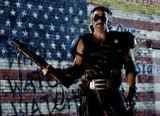
The Comedian
The story revolves around the character of Edward Blake/ The Comedian. Even thought he was killed right at the beginning of the book, the flashbacks his teammates remember him by paint a clear picture of what kind of a man he was. He’s a crazy sociopathic rapist that enjoys the suffering and killing of other people. The funny thing is that Blake is completely self-aware of the immorality of his actions, but decides not to change because he sees that America has already gone to hell anyway. He knows that the American dream has become corrupted, but decides to cope with the bleakness of the world by becoming a living parody of it. He wears the American flag on his costume to reflect the ugliness of what America has become. Blake commits inhuman acts, and the government treats him like a war hero instead of a criminal. When Jeffery Dean Morgan played The Comedian, it was spot-on casting. Not only did he look just like he did in the book, but he also perfectly captured the unsympathetic nature of his character, while at the same time showing the bitter loneliness he brought upon himself in the end.
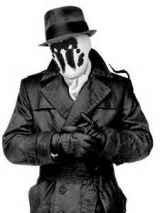
Rorschach
Rorschach was a sane masked crime fighter back in the past, but after a horrifying encounter with an unredeemable child killer, he just snapped. He no longer saw the humanity left in his city so he hunts down criminals like dogs. He’s the embodiment of psychological torment and paranoia that was present at the time. He wears a mask that resembles a rorschach test, and he’s always untrustworthy of everyone he meets, always assuming they may, or may not be a part of a conspiracy theory. Jackie Earle Haley was set with the task of portraying Rorschach on the big screen, and just like Jeffery Dean Morgan, he just embodied this character. Everyone who saw the film would agree that Haley was a great Rorschach. He perfectly captured a lunatic who takes orders from no one. His motivation throughout the film is clear; he still fights for the American people, even if he has to die for it.
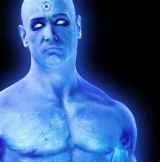
Dr. Manhattan
Jon Osterman /Dr. Manhattan was a scientist who got caught in an experiment that malfunctioned, and in the process turned himself into a living embodiment of god. He’s immortal, he can teleport, he can see into the future and he can break the laws of physics and science. The problem is he’s devoid of almost all human emotions, and can’t even find a logical reason to love his girlfriend anymore. When he goes to Mars he almost prefers it as opposed to earth because there are no humans trying to meaninglessly destroy each other in his eyes. When Bill Crudup was casted as Dr. Manhattan, everyone wasn’t sure if he’d be right for the role. However, he ended up giving a remarkable performance, playing a character that was not easy to pull-off. He gave Dr. Manhattan a soft and soothing voice to make him sound very intelligent. At the same time, he gave a little humanity to the role, showing that he does care for the human race in his own way. The backstory, which was a whole chapter from the book, is still present in the film. It deals with Jon’s moral complexity as to whether, or not he should bother with the human race.
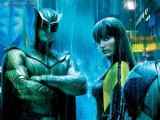
Silk Specter II and Night Owl II
Laurie Jupiter/Silk Specter II and Daniel Dreiberg/Night Owl II have the same dilemma in the story. They’re both living in the shadow of their old predecessors. The first Silk Specter was Laurie’s mother and first Night Owl taught Dan as a boy to eventually take up the Night Owl mantel. Soon both Laurie and Daniel start falling in love with each other, and they come out of retirement from being superheroes. Even though they both say how much they disliked the masked crime fighter days, they soon embrace it, realizing they don’t really make a difference in the world as normal people, so they might as well fight crime as masked heroes. Patrick Wilson’s performance as Night Owl was great casting, by capturing the nerdy and nobleness of Daniel, as well as the realization of his true calling as a superhero. Unlike the other Watchmen in the book, Daniel is never given a back story, which only makes him even more of a normal and relatable character to the reader. Malin Akerman as Silk Specter II played the character just right, bringing life to her character. Her character is still dealing with her mother issues, as well as trying to hide away her true realization of who her father might be. She seems the most normal compared to her teammates, seeing the superhero persona as nothing more than dressing up in a costume for Halloween.
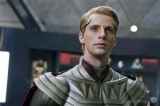
Ozymandias
In the graphic novel, Adrian Veidt/Ozymandias is the world’s smartest man, and was the first Watchmen to retire before the forcing of superheroes into retirement was even thought of. He may look like a convincing business man when he’s running his company, but he still has an ego because of his massive intelligence, and shows a huge god-complex by the climax of the book. Matthew Goode plays the character just right by portraying Veidt as a great powerful man, who could be a massive threat if gone down a dark path.
What was Left out of the Book
If Zach Snyder were to take every little detail from the graphic novel, the film would be about 6-7 hours long as opposed to the 3 hours which is still a long time for the audience to sit through. There is just so much context and detail about the characters and the world they live in that the graphic novel usually requires multiple reads just to grasp all the concepts presented. So, there are obviously details left out of the film, but does this hurt the film adaptation? Something that is sadly missing from the movie is most of the side characters. Characters like Bernie the newsstand guy, Hollis Mason/the first Night Owl, the lesbian couple Joey and Aline, and Rorschach’s therapist Dr. Malcolm are all either sidelined in the film, or are cut out entirely. Alan Moore included all these side characters in the book because he wanted to show how normal people are affected living in a world where nuclear war is inevitable, and a god like being like Dr. Manhattan actually exists among them.
Even the main characters in Watchmen have some parts of their backstories left out for various reasons. For example, the origins of Rorschach’s mask and what the mask symbolizes to him is not mentioned in the film. Veidt explaining his backstory about how he became the man he is today is left out of the film entirely. In the book there is also a story within the story called Tales of the Black Freighter, which is about a man being shipwrecked and is trying to return to his family. The shipwrecked man becoming more savage and monstrous symbolizes the ugliness that is going on in the main story. The Black Freighter story could have been taken out the book and it would not take away from the main story. The movie doesn’t include the story at all, but they did release a straight to DVD animated movie of Tales of the Black Freighter.
Some scenes from the book played out differently in the film, but the changes were minor. One scene that was slightly modified was when Rorschach encounters the child murderer’s house. In the book, Rorschach discovers that the killer has fed the remains of a little girl to his dogs, and in revenge he burns the house down with the killer still inside. In the film, the scene is exactly the same except instead of burning the killer alive, Rorschach repeatedly hacks at the killer’s head with a butcher’s knife. Jackie Earle Haley stays true to the book and remains dead silent throughout the whole scene, showing he has had it with vile criminals running rampant throughout his city. In the opening scene of the film, Edward Blake is trying his best to fight off his murderer the best he can. The book begins differently with Blake already having been killed, and police are investigating his murder. The scene works because it’s an exciting scene to watch, and it shows Blake is still a kick-ass fighter even at his age, even though he still loses in the end.
There are more examples of plot-points left out from the book, but with the movie being almost 3 hours long, Zach Snyder did his best to portray the most significant parts of the book. They recreate the graphic novel scene to scene while changing a few things here and there, which brings up the most controversial part of the film.
The Ending
When fans and critics saw the ending of the film, they either accepted it, or it ruined the film entirely for them. Most of the critics that read the graphic novel hated it even more because they felt it missed the whole meaning of the book’s ending. Is the ending of the film really that insulting to the original, or does it work in the context of the film?
(Please note: These next two paragraphs will contain spoilers for the book and the movie, so read with caution.)
In the ending of the book, Veidt made a nuclear strike ageist New York City and kills most of the citizens. He made an illusion of a giant alien hovering over New York, to make it look like there was an alien attacking the city so that the American and Soviets would stop fighting each other and focuses on this new threat. Veidt’s plan was psychopathic, but it worked, and by the end of the book the world has united to focus on destroying the non-existent alien threat. All the other Watchmen knew he was behind it behind the attack, but they all decide to keep quiet; realizing that the world will just go back to fighting each other if they learned the alien was a hoax. Rorschach is the only one who will not keep quiet because he feels the American people should know, but is sadly silenced by Dr. Manhattan.
The film ending is slightly different. Instead of the giant alien, Dr. Manhattan is the one that is blamed for the attack on New York, and soon the world has united to destroy him. Dr. Manhattan decides to stay on Mars for the rest of his life, and plays along in Veidt’s lie. The ending does work within the film and it still gets the message across that the book established which is: in order to save the world, you first half to trick it. In the film, Dr. Manhattan actually created the bomb that destroyed New York and gave it to Veidt willingly, without knowing Veidt’s true intentions for it. Dr. Manhattan was supposed to save the world from nuclear destruction and in a sense he did, but only at the cost of millions of lives. The film kept the meaning that the book’s ending had, but just simply changed the context at which it happened.
Themes
Because Watchmen is such a multilayered story, there are many different themes and symbolisms presented in the graphic novel. A recurring theme presented in the book and film is: do super-heroes belong in the real word, and in politics? If heroes were among us in our reality, they would eventually have to be under constant watch by the government. That could lead to the heroes becoming nothing but dogs of the military, to be ordered around by the government no matter how bad the task. The film demonstrates how catastrophic this can be in the scene when The Comedian and Dr. Manhattan are fighting in the Vietnam war, killing Vietnamese soldiers left and right. Dr. Manhattan is a giant in this scene, as he blows up Vietnamese solders like it is nothing, symbolizing the power America has against the rest of the world. Even though being under constant supervision by the government is bad, another question to ask is: are super-heroes dangerous with out the government? Rorschach after the retirement of super-heroes takes orders from no one, but he’s unstable because there is no one to hold him back from his horrid actions. Veidt shows how dangerous it can be, to have the world’s smartest man uncontrolled by anyone. Maybe Daniel and Laurie had the right idea staying in retirement for a while, seeing the fight as a lost cause. The question to be asked is do the super-heroes need the government, or does the government need the super-heroes?
Another theme presented in Watchmen is how the past can distract us from the future. The object that perfectly embodies this is a perfume called Nostalgia, which was made by Veidt Enterprises. Nostalgia is mostly associated with Laurie because she’s in denial when it comes to her past. In the past, Laurie’s mother was raped by The Comedian, and this explains why she hated The Comedian so much. The thing is, as Laurie’s mother sits in a retirement home all by herself, she practically forgives Eddie Blake for what he did, and considers it water under the bridge. What he did to her was so monstrous, and she just forgave him. It’s probably because she still loved him, and it’s explained why by the end of the book. Daniel is also associated with Nostalgia because of his secret longing to be a super-hero again, just to feel like he matters in the world. It’s ironic that Veidt made Nostalgia because Nostalgia is supposed to represent staying in the past, and all he wants to do is change the future for his new utopia. Sadly, Nostalgia is barley mentioned in the film, and is only seen in a commercial one time in the whole film.
One last important theme do discuss is nuclear war. Because the story is set in an alternate universe, the idea of World War III slowly approaching would be a terrifying concept, and something that will hopefully never happen in real life. Clocks are shown constantly in the book to symbolize how fast World War III will be coming, and also to show how fast life goes by. In the book, The Doomsday Clock was a clock that counts down the arrival of nuclear war, and it is shown at the end of each chapter. In the movie, the doomsday clock in shown in the beginning, but just like Nostalgia, it was only represented in the film once or twice. In the chapter titled Watchmaker that revealed the origin of Dr. Manhattan, a teenage Jon was working for his dad making watches, until his dad told him to quit worrying about watches, and instead to focus on the nuclear war at hand. Jon’s father is shown in the film, but is portrayed as a business man, who doesn’t seem to worry about the war at all. Another use of symbolism is graffiti art depicting a man and a woman kissing called The Hiroshima Lovers. It represents two shadows of lovers kissing, as they’re blown up by the nuclear blast. When watching the film, the Hiroshima Lovers can be spotted in the background as an easter-egg. Because the film was made in 2009, it tries to ask if nuclear war is still relevant in our day and age. While nuclear weapons were not as huge today as in the Cold War, some countries still threaten to use new age nuclear weapons against other countries. The message of Watchmen can still be relevant in today’s society.
Does the film work on its own?
Zach Snyder was given a lot of pressure when given the task to adapt Watchmen. The graphic novel seemed un-filmable because the long length of the book, and many themes established though out the story. Every film adaptation of a book will always be living in the shadow of that book. It can be hard for a director to adapt any story because they must absolutely stay true to the source material, but at the same time they should bring distinctive style to the film. Because Watchmen is such a hard property to adapt, his own story telling is put to the side and mostly follows the storyline of the book note for note. What Snyder does make distinctive is his visual presentation. The film was shot on a digital film camera, and makes the 1980’s look new and shiny, which makes the film look great on scale. There is also a lot of slow motion shots, which Snyder used extensively in his previous adaptation of another graphic novel 300. So Watchmen can be enjoyed on its own merits, it’s just that its similar to the graphic novel in so many ways it’s sort of hard not to compare the two.
In conclusion, Watchmen is a faithful adaptation of the original source material because it includes everything from the book that is essential for telling this story. The characters, the motivations, the setting, and even the message of the film is all here. Overall a great movie adaptation from a already great graphic novel.
What do you think? Leave a comment.











I thought the movie was so-so but aside from the difference between the book/film, did anyone else think the the soundtrack was terrible? The choice of songs didn’t help and ended up being more of a distraction from the film more than anything.
I will agree with you on the bizarre soundtrack. That’s one aspect of the film that was done vey poorly, and I wish could of been handled better.
The movie was garbage; I was always in the camp that thought the movie shouldn’t be made, but I’m certain that it should have been done by a more talented, more nuanced director. It’s as if he had the amazing talent to make almost every bit of dialogue sound like it’s from a much worse comic book, and there was a hell of a lot of dialogue. Honestly, a word for word adaptation of the comic would have been more palatable.
I prefer the book.
What I thought was particularly annoying was how all depth was removed from the character. Rorschach is clearly unstable, but clearly not the extreme right-wing, misogynistic, gay-hating paranoid nutjob he is in the comic. Now he’s just a Batman Who Kills. They just removed the lines that help round out the character. But they did that all around, they turned almost all characters 1-dimensional, removed all doubt from the conclusion as well! Everything’s just a hippie commune.
I personally adored the adaptation (to each his own, I guess). There were definitely some more delicate themes that added amazing depth to the book and were neglected in the film, but overall it seems to me that the changes made were a reflection of what will and won’t work in a movie vs a comic. If the adaptation were completely loyal, why bother, after all? We already have dialogue and pictures…
And that soundtrack, man. The use of “The Times They Are A-Changin'” for exposition…I could rave about that all day.
I love that “The Times They Are A-Changin” song by Bob Dylan. I love how it summed up America’s history form the 30’s-80’s.
As somebody who watched the movie before reading the comic books, and as somebody who absolutely LOVES the movie, I can safely say that I love your analysis of the film and how it relates to the comic book. Not being a comic fan myself, I can’t really judge how the original really holds up for its medium, but I think personally that the film adaptation is one of the best of it’s medium.
I’m glad to see a movie fan that loves the “Watchmen” film as much as I do. Thanks for your support.
I picked up a softbound copy of the book at Wondercon last weekend. I’ve never read Watchmen before, so like most people, my interest in the movie and overall love of comics prompted me to read through before the I see the movie.
I found the movie to be kinda dull. I have the novel and enjoyed but there is something lost in the transition to the big screen. Opening credits were great though.
i definitely feel this is a pretty faithful adaptation of the novel. obviously the ending is altered, but as mentioned it captures the same idea while making it more accessible to the moviegoers.
I thought some of the violence was gratuitous and not necessary to move along the story. A prime example of this was Rorschach taking the meat cleaver to the murderer of the little girl as opposed to leaving him in the burning house with one of his “tools” and a choice as he did in the book. (Even though it was pretty clear in the book that Rorschach would have killed him had he emerged from the burning building).
True, the movie was overly violent at times, but so was the book.
I enjoyed the film. The new ending made sense to me. Jon leaves Earth in what everyone assumes is a confused mental state, returns, and proceeds to blow stuff up. Why the US isn’t blamed is because everyone knows he went AWOL.
I really wish I could have hated this movie, but I enjoyed it a great deal. I feel like they made all the right changes in order to make it work on screen.
If the CGI was available to make the destruction of New York similar to the book, and I can’t believe it was not, why change it other than for the sake of being different?
One thing that’s been bothering me is the Sally Jupiter attempted rape. It was far more violent than the comic…
I felt the movie made the “Watchmen” (aside from Dr. Manhattan) more metahuman than masked crime fighters. To me, this is a big change, so for example, Rorschach’s strength came from his vigalent “no compromise” mantra and his anger and Night Owl was more techno-geek than they were crime fighting super-beings. Viedt’s intelligence aside, I never read anything superhuman into these characters, yet the otherworldly strength they possess in the movie indicates otherwise.
I actually liked both the movie and the book, the movie works well with the cuts they made from the book and the book works well because, well…it’s a book. Books are built for lengthy explanations and room for detail, movies are harder because of the time constriction and are thus, more concise. They did a good job with the adaption, though I did wish they had included some of the characters that were cut. Overall, I love this article and Watchmen!
While the film has its moments, I can’t help but imagine what the Terry Gilliam adaptation could’ve been.
I thought this movie was amazing.
Loved all the actors, perfect casting if you ask me. particularly Rorschach and Comedian.
I’m a huge fan of Watchmen, especially Rorschach. I think his character was the most popular because, as an audience, we understand his pain and the path he took to becoming who he is or was now.
Even though Snyder’s Watchmen didn’t reach the heights of the source material, it was still an entertaining film. I remember seeing the trailer for Watchmen during The Dark Knight and thinking how awesome the film would be. Hype wore down and the film never reached my expectations. It was an enjoyable film at the time but definitely not re-watchable like Snyder’s 300.
I loved Watchmen when I first saw it, but I recently went back and watched it again for the first time in years and it hasn’t held up well for me. I’ve never read the actual comic, but I’m motivated to after reading this.
To even compare the film to the novel is difficult for me. While the book’s visual style, lighting, and mood are all painstakingly recreated in the movie, I cannot help but feel that that is all Zach Snyder is capable of: Adapting an already story boarded narrative into a different visual medium. His change of the ending is mediocre at best and ultimately very lazy compared to the effort and thought that Moore and Gibbons put into the novel. To make Doctor Manhattan-the nihilist who simply doesn’t care-the bad guy is far more cowardly than taking into account what it would mean for someone who cares A LOT like Veidt to kill millions of people. For those who have not read the book but seen the movie, go read it now, it is so much more interesting. Also, the Book Watchmen and Philosophy: A Rorschach Test is a great analysis of why the book is so good.
I think that Zack’s biggest failure was making the movie TOO true to the material. A lot of it is almost a page-by-page adaptation of the book to the movie. There are some differences, but he didn’t take enough liberties to make it stand on it’s own- as the Watchmen but with his own signature take on it.
I feel like while content-wise the Watchmen film was quite similar to the graphic novel, save for the big character and plot divergences mentioned in the article, where the film loses its faithfulness to the graphic novel is its gleeful abandonment of the graphic novel’s aesthetic. Gone is the garish yellow, blue, and pink, replaced by Zach Snyder’s boring palette of brown and grey.
The fact is the four colour palette of the graphic novel unified the entire narrative; it didn’t matter whether we were on Mars, in the Arctic or Manhatta, or in the pages of a pulpy serial, the colours were the same throughout. In the film all aesthetic unity is lost.
This proves, more than the arbitrary plot and character changes, that Snyder was more concerned with his aesthetic than with the source material’s.
For movies where you don’t want to go too heavy on the A-listers, having one 2nd or 3rd-tier A-lister can be helpful for publicly and execution and contribution to creative direction. Bonus if the somewhat major actor does theatre.